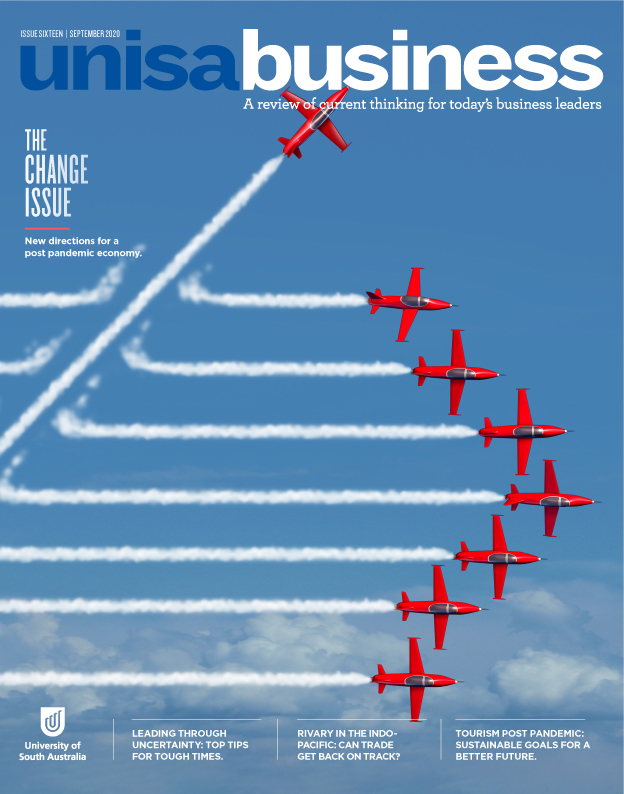01 September 2020
Author: Dr Jana Matthews
As Australia tries to find its feet after the pandemic, many employees and company leaders are wondering “Are we going to make it?” Here, Dr Jana Matthews, ANZ Chair in Business Growth, Professor, and Director of the Australian Centre for Business Growth shares advice on what CEOs need to do to survive and position their companies for growth.
Right now, many CEOs are lying awake at night wondering, “Are we going to make it?”. And with more than 600,000 Australians unemployed as a result of government-imposed coronavirus restrictions and shutdown measures, it’s easy to see why.
Having worked with hundreds of CEOs – in good times and in bad – I have seen what successful company leaders do, how they think, and how they ‘show up’ when facing uncertainty. Here’s how their “can do” attitude and resilience enable them to get through tough times.
What do you need to do?

Think of your company as a car. You need to have a car that’s built for purpose (for example, a race car, an SUV, a family sedan, or a ute). To travel well, you need to keep your car in good shape, have petrol in the tank, ensure the spark plugs are firing properly, the tires are properly inflated, have warning lights that flash when systems are not working – and a good driver.
If you want to survive and rebound, your company’s organisation must also be built for purpose, maintained properly, and operating as efficiently as possible, with dashboards and warning lights – and a good leader.
Good leaders do not need to know all the answers, but they need to know what questions to ask, including:
- Are we selling what customers want?
If customers don’t buy enough of what you offer, then you won’t have enough petrol (revenue) in the tank. It’s time to look hard at who is buying and what isn’t selling. Once you know this, you can decide whether you need to discontinue items, or invest in different sales strategies and skills. - Who are our ideal customers?
Identify the customers who enable you to make profit. How many customers does it take to generate 80 per cent of your revenue? Why are they buying from you? Once you analyse which customers contribute most to your revenue and profit, are strategically important to your business, and are great to work with, then this is who you should be targeting. A small number of customers can be good news or bad news – depending on the industry – but servicing lots of small customers who buy very little could end up costing you a lot of money and eat up your profits. - Are our people the right people?
In the past two months, CEOs have talked a lot about staffing, with many of them making the hard call to ‘weed the garden’ of misfits, malcontents, and non-performers — a task they admit they should have done long ago. The people they have let go are usually not ‘bad people’; they just weren’t a good fit for the organisation, they might have required a lot of attention, or they just didn’t perform as required. The most difficult discussions are with great people who do match your values and who are high performers but are doing jobs that you no longer need. If there is no other job within the organisation for them, then unfortunately, you have to let them go. - Are we managing our financial resources prudently?
Every CEO I know has spent hours analysing their financials – reviewing every category, every sum, as well as all the sub-items that make up that sum – to ensure they have the funds to sustain their business and, importantly, can move quickly when new opportunities appear.
The three things they’re asking are:- Is this the right thing to be doing, especially now?
- If yes, how can we do more of this for the same amount of money we are spending?
- If yes, can we do it for less money?
How do you need to think?

For CEOs, systems thinking is critically important. The ability to navigate through chaos is directly related to knowing what data to analyse and recognising patterns in the data. This helps you understand how certain outcomes will impact your company so that you can act quickly.
Chess is a very important game to learn to play because it teaches you to think from at least two perspectives: yours and your opponent’s. Chess also requires you to think two or three steps ahead – a valuable skill in today’s highly disrupted and interconnected environment.
But in the post COVID-19 environment, you need to learn to play three-dimensional chess –execute short-term while you are planning long-term, think about what the company must ‘do’ as well as what the company must ‘become’, and calculate the impact of social changes in other countries on your markets and your company.
Some CEOs during COVID-19 were saying, “It’s all about staying alive!” and they were focused on Facebook marketing, product guarantees, incentives for their sales team, negotiating with their landlord, and getting a bank loan.
But those who were using the time to position their companies for growth were focusing more on longer-term strategies and goals. For example, should we spin off one of our divisions into a new company? Should we buy a company, or look seriously at that offer to buy our company? Would it be better to expand our manufacturing operation in Australia and focus on finding new suppliers here – even if it results in higher costs - than continuing to search for low cost providers in other countries? These are the big questions that you need to think about - at the same time you are addressing the here and now.
How do you need to “show up”?

The ability to self-manage is incredibly important for company leaders. You must remember that everyone is watching you, all the time. Staff take their cues from you, so if you are critical or disrespectful, this will have a negative impact on them, and they will begin to mirror your behaviour. If you spiral downward every time someone brings you bad news, people will stop bringing bad news and that could be catastrophic for the company.
Successful leaders are steady and able to guide their organisation through uncertainty.
Your people have committed to working with you and with each other to serve your customers, to help you build something awesome. They want their leader to ‘show up’ as someone who is mission-driven, thoughtful, strategic, compassionate, consistent, respectful, and truthful.
So, right now, what do you tell them? Tell them the truth, engage them in developing survival plans, and thank them frequently for all they do to help your company survive. Pledge your best efforts to lead them and the company, to ask good questions to make sure people are doing the right things. Use systems thinking, and show up, every day, living your company’s values.
Of course, there are no guarantees; there never were. But the odds of surviving and thriving are significantly increased if you do, think and show up as a leader who understands how to navigate through uncertainty.



